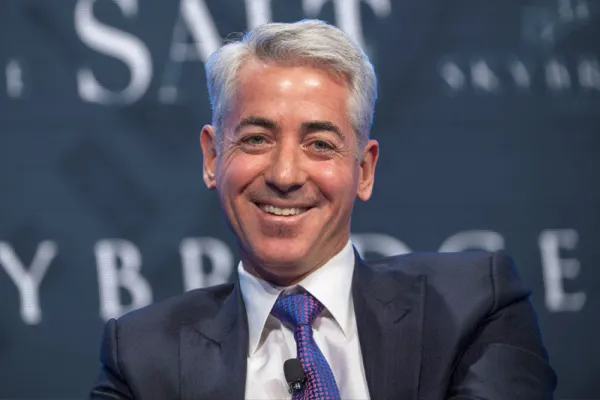Let the war begin. Bill Ackman, one of the few hedge fund managers who runs into, and not away from, the media spotlight, acknowledged on Wednesday afternoon that the super secretive new investment idea he was planning to disclose on Thursday at a conference in New York is a short position in Herbalife, a nutrition and skincare products company. Ackman called Herbalife a pyramid scheme; not surprisingly, the stock quickly plunged, closing down more than12 percent at $37.34. Shortly after Ackman disclosed the name of the stock, an irate Herbalife CEO Michael Johnson went on CNBC and accused Ackman of engaging in "blatant market manipulation." He asserted that a huge amount of puts on his stock expire on Friday. (This is the same stock Greenlight Capital’s David Einhorn was rumored to be short earlier this year after he raised several critical issues on a conference call with management.) On Wednesday, Ackman hastily scheduled a “special event” for the following day connected to the Sohn Investment Conference, where he promised to unveil his latest blockbuster investment. Ackman, who is said to have begun shorting Herbalife seven or eight months ago — around the time Einhorn raised questions about the stock — told CNBC after Johnson made his accusations that he did not own any puts on the stock and has not discussed Herbalife with other investors. We’ll be there Thursday to hear his thesis and other thoughts.
Meanwhile, Ackman has been plodding along of late. His Pershing Square hedge fund is poised to underperform the market for the second straight year, posting a gain of just 6 percent through November after losing 2 percent in 2011. One of his most recent high profile investments, JCPenney, has not fared too well. The stock is down about 7 percent since he initially bought it in the third quarter of 2010. Interestingly, the stock surged 6 percent or so on Wednesday, before closing up more than 3 percent. Ackman now owns nearly 18 percent of the embattled retail chain, whose strategy of switching to a policy of everyday low prices has not yet panned out. However, JCPenney is not his largest investment. As of the end of the third quarter, he owned bigger positions in Canadian Pacific, Procter & Gamble, General Growth Properties and Beam.
How fast the mighty can fall. CNBC reported that Morgan Stanley Wealth Management is recommending clients redeem six hedge funds offered by John Paulson, who famously made billions shorting subprime before the market collapsed. Some of his funds are down by double-digits this year after posting lousy results in 2011. As a result, many of his investors who got into Paulson’s funds after he made his astounding gains in 2007 shorting the sub-prime market are actually in the red.
Activist Starboard Value L.P. has reduced its stake in marketing company Viad by 430,000 shares, to 4.2 percent of the total outstanding. The hedge fund, led by Jeffrey Smith, did not say why it sold the shares. Now that it has dipped below the 5 percent mark, Starboard no longer needs to file future amended statements unless it goes back above that threshold.
Aaron Smith, a former managing director of the systematic trading-oriented Superfund, is opening his new fund, Pecora Capital, to outside investors. He hopes to grow the managed futures fund to $400 million. However, unlike most of these kinds of funds, which use computers to identify trends, Smith plans to inject human judgment into the process and look for overextended markets. He is mindful that many of these managed futures funds, which are also called trend followers, have been losing money for more than a year. Superfund is the hedge fund founded by Christian Baha in Vienna that advertised on CNBC, until it started posting lousy performance. Baha even qualified for Alpha’s annual Rich List in 2008, when most traditional hedge funds that generally made the top-25 list lost money.





